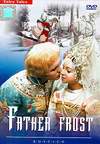Father Frost
Image Entertainment
Cast: Natalya Sedakh, Edouard Izotov, Gyorgy Millyar
Extras: Theatrical Trailers, Photo Gallery, Archival Materials, Video Interview with Natalya Sedakh, Folk Songs
Rating:
Directed by Aleksandr Row, "Father Frost" starts with the framing device of an old "babushka" reciting the familiar "once upon a time" fairy tale invitation. In a small village, the kind hearted Nastenka lives a miserable life, ever-suffering under the cruel heel of her stepmother and stepsister, while her father caters to his demanding wife’s whims and endures her incessant insults. In another village far away, Ivanushka begins his journey to manhood by leaving home. However, Ivanushka’s pride must be tamed if he is to be the worthwhile man his elderly mother wishes him to be.
From a plot perspective, "Father Frost," or "Morozko" basically plays like a Russian version of "Cinderella," with Nastenka and her kind but doddering father submitting blindly to the wicked stepmother. Modern audiences may find Nastenka’s passivity slightly off-putting or the character of Grandfather Mushroom just plain weird (although no one questions Cinderella’s fairy godmother). Yet most fairy tales do not represent life as it is (or was), but communicate ideals that children should embrace as they enter adulthood. Like all good fairy tales, "Morozko" as a fictional paradigm praises humility over ego, hard work over lassitude, and honesty over duplicity, which probably is one reason why the cinematic form ducked the radar of Soviet ideological correctness.
The full-frame transfer bursts with saturated, story-book colors. Detail delineation is superb, with deep blacks and excellent contrast. I may remember seeing the movie from holiday morning reruns on television, but the movie never looked this crisp and clean. The source material shows a few blemishes (as well as editor marks for the opening and closing narrator scenes) but not to distraction. Digital or compression artifacts? Nyet.
The disc also hosts quite a few supplements including archival footage of director Row on the set, liner notes about the characters, their archetypes in Russian fairy tales and folk literature, two of the film’s songs in a separate section (in Russian), a montage of other fairy tale titles in the Ruscico collection as well as a video interview with Netalya Sedakyh ("Nastenka") reminiscing in Russian (with English subtitles) about working on her first film and some interesting comments about Row. The most fascinating section was the "Museum Ruscico," offering brief but fascinating notes of the different concepts and characters, like the origins of Baba Yaga or the importance of the Stone of Destiny (yes, there is a Stone of Destiny in the story.)
A word about the DVD itself. Image has licensed the title from Ruscico, who produced, mastered and replicated the actual disc. The first menu that pops up is in Russian. Don’t panic; within a few seconds, it changes to English and all menus thereafter will be in English. (My review copy is from Ruscico, purchased through their website, www.ruscico.com. The Image edition is exactly the same, except the Ruscico cover is in Russian and the Image cover is in English.)
Perhaps corny, perhaps hokey, the Russian fairy tale genre hold a special place in the hearts of film fans, young and old, who know about them. "Father Frost" may not wow with technology, but its romantic heart beats as vigorously as a child’s unshakable faith that good will always prevail.







